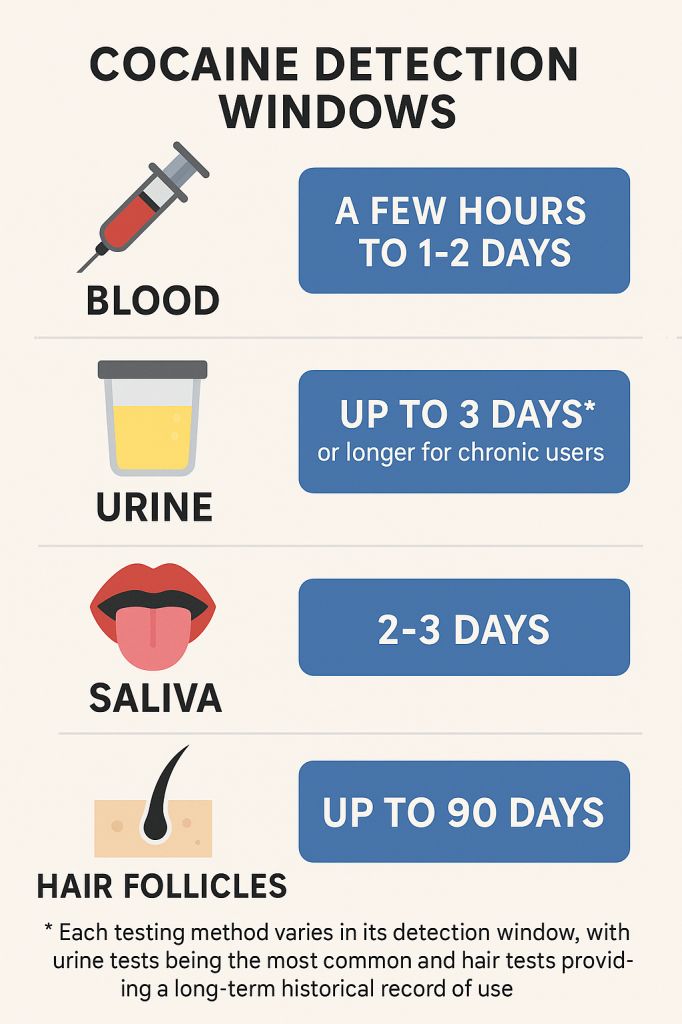Cocaine is a powerful stimulant drug that affects the central nervous system. It is derived from the coca plant and is known for its stimulating and addictive properties. One common question among cocaine users and those who may be subject to drug testing is how long the drug remains detectable in the system.
In short, drug tests for cocaine can detect its presence in blood for a few hours to a day or two, in urine for up to 3 days (or longer for chronic users), in saliva for 2-3 days, and in hair follicles for up to 90 days. Each testing method varies in its detection window, with urine tests being the most common and hair tests providing a long-term historical record of use. Understanding the factors that influence the detection window of cocaine can provide valuable insights into the risks associated with its use and the potential consequences for those who may be tested for it.
How Long Does Cocaine Stay in Your Body?
In short, The detection times for cocaine depend on various factors, including the specific drug test being used, individual metabolism, frequency and amount of use, and overall health. Drug tests for cocaine can detect its presence in blood for a few hours to a day or two, in urine for up to 3 days (or longer for chronic users), in saliva for 2-3 days, and in hair follicles for up to 90 days. Before we explore any detailed information, it is crucial to understand the fundamental pharmacology of cocaine.

Understanding Cocaine: A Brief Overview
Cocaine is a highly addictive drug that is classified as a Schedule II controlled substance by the Drug Enforcement Administration (DEA). It comes in the form of a white powder, which is typically snorted, or in solid crystal rocks known as “crack cocaine,” which are smoked. When consumed, cocaine rapidly enters the bloodstream and produces intense euphoria and increased energy levels. However, these effects are short-lived, lasting only for a brief period of time.
The effects of cocaine are due to its interaction with the brain’s reward system, particularly a neurotransmitter called dopamine. Dopamine is responsible for feelings of pleasure and reward, and cocaine blocks its reuptake, leading to a buildup of the neurotransmitter in the brain. This results in the characteristic feelings of euphoria and increased energy associated with cocaine use.
What is Cocaine?
Cocaine is a powerful stimulant drug that is derived from the leaves of the coca plant, which is native to South America. It has been used for centuries in various forms, such as chewing the leaves or brewing them into tea, for their stimulant effects. However, the modern form of cocaine that is commonly abused is a purified, crystalline powder.

When consumed, cocaine quickly enters the bloodstream and is transported throughout the body, including the brain, where its effects are most pronounced. The drug acts by inhibiting the reuptake of certain neurotransmitters, such as dopamine and norepinephrine, leading to increased levels of these chemicals in the brain. This results in a range of effects, including increased energy, heightened alertness, and a feeling of euphoria.
The Effects of Cocaine on the Body
Cocaine has both short-term and long-term effects on the body. In the short term, the drug produces intense euphoria, increased energy, and heightened alertness. It can also cause feelings of agitation, restlessness, and anxiety. Cocaine’s effects typically last for a relatively short duration, usually around 30 minutes to an hour, depending on the route of administration.
Long-term cocaine use can have serious consequences for physical and mental health. Chronic use of the drug can lead to cardiovascular problems, such as high blood pressure, heart attacks, and strokes. It can also damage the respiratory system, leading to chronic bronchitis, asthma, and other respiratory conditions. Additionally, frequent cocaine use can result in neurological effects, including memory loss, cognitive impairments, and an increased risk of mental health disorders like depression and anxiety.

The Metabolism of Cocaine
The metabolism of cocaine refers to how the body processes and eliminates the drug. Understanding how cocaine is metabolized can provide insights into the detection times for drug tests and help individuals make informed decisions about their drug use.
How the Body Processes Cocaine
When cocaine is consumed, it is rapidly absorbed into the bloodstream from the site of administration. From there, it is distributed throughout the body, including the brain, where it produces its euphoric effects. The liver plays a crucial role in metabolizing cocaine.
In the liver, cocaine is broken down into several metabolites, with the primary metabolite being benzoylecgonine. This metabolite is then further metabolized into other compounds, including ecgonine methyl ester and ecgonine. These metabolites are eventually eliminated from the body through urine, feces, and sweat.
Factors Influencing Cocaine Metabolism
The metabolism of cocaine can vary from person to person and is influenced by various factors. One of the key factors is individual health and metabolic rate. People with a higher metabolic rate tend to eliminate cocaine and its metabolites more quickly than those with a slower metabolism.
The frequency and amount of cocaine use also play a role in its metabolism. Chronic and heavy use of cocaine can lead to the accumulation of metabolites in the body, resulting in a longer detection window. On the other hand, occasional and low-dose use may result in a shorter detection window.
Hydration and diet can also impact the metabolism of cocaine. Staying hydrated and consuming a healthy diet can help the body eliminate the drug more efficiently. Conversely, dehydration and poor nutrition can slow down the metabolism process and extend the detection window.
Cocaine Detection Times by Test Type
Drug tests can detect the presence of cocaine and its metabolites in various biological specimens, including blood, urine, saliva, and hair. The detection times for cocaine depend on the specific specimen being tested and may vary from person to person.
1. Cocaine Detection in Blood

Cocaine is rapidly absorbed into the bloodstream after use, making it detectable in blood within minutes. However, the actual detection window for cocaine in the blood is relatively short, typically ranging from a few hours to a day or two. It is worth noting that the presence of cocaine in the blood alone is not necessarily indicative of impairment or recent use, as its effects may have already worn off by the time of testing.
2. Cocaine Detection in Urine

Urine testing is the most common method used to detect the presence of cocaine in the body. Cocaine and its metabolites can be detected in urine for a longer duration compared to blood testing. The detection window for cocaine in urine is usually up to 3 days after the last use but can be extended to a week or more for chronic users or in cases of heavy cocaine use.
3. Cocaine Detection in Saliva

Saliva testing, also known as oral fluid testing, is another method used to detect the presence of cocaine. Cocaine and its metabolites can be detected in saliva within minutes of use and can remain detectable for up to 2-3 days. However, the detection window for cocaine in saliva is relatively short compared to other methods.
4. Cocaine Detection in Hair

Hair testing is a method used to detect long-term drug use and can provide a historical record of cocaine use. Cocaine and its metabolites can be detected in hair follicles for up to 90 days or even longer, depending on the length of the hair sample collected. However, it is important to note that hair testing is not able to determine the exact timing or frequency of drug use.
Factors Affecting Times to Detect Cocaine in Your System
The detection times for cocaine can vary from person to person due to various factors that influence its metabolism and elimination from the body. These factors should be taken into consideration when evaluating the reliability and accuracy of drug test results.
Individual Health and Metabolic Rate

Individual health and metabolic rate play a significant role in the metabolism and elimination of cocaine from the body. People with a faster metabolism tend to clear the drug more quickly compared to those with a slower metabolism. Factors such as age, weight, overall health, and liver function can all influence individual metabolic rates and, consequently, the detection times for cocaine.
Frequency and Amount of Cocaine Use
The frequency and amount of cocaine use are important factors that affect its detection times. Chronic and heavy use of cocaine can lead to the accumulation of the drug and its metabolites in the body, resulting in a longer detection window. On the other hand, occasional and low-dose use may result in a shorter detection window.
The Role of Hydration and Diet

Hydration and diet can have an impact on the metabolism and elimination of cocaine. Staying hydrated and consuming a balanced diet can help the body eliminate the drug more efficiently. On the other hand, dehydration and poor nutrition can slow down the metabolism process and extend the detection window for cocaine.
The detection times for cocaine depend on various factors, including the specific drug test being used, individual metabolism, frequency and amount of use, and overall health. Understanding these factors can provide insights into the risks associated with cocaine use and the potential consequences for those who may be subject to drug testing. It is important to note that the information provided in this article is for educational purposes only and should not be considered as medical or legal advice. If you or someone you know is struggling with cocaine addiction, it is recommended to seek professional help for a proper assessment and appropriate cocaine addiction treatment.
Psychological Impact of Cocaine Withdrawal
The psychological impact of cocaine withdrawal is profound and can be a significant barrier to successful recovery from addiction. Withdrawal from cocaine often triggers a range of psychological symptoms that can vary in intensity and duration, depending on the duration and intensity of use. Common psychological symptoms include depression, anxiety, irritability, extreme cravings for the drug, and vivid, unpleasant dreams. These symptoms occur because cocaine use disrupts the brain’s natural production of dopamine, leading to decreased levels when the drug is no longer used.
Potential Triggers for Relapse: Triggers for relapse during cocaine withdrawal can include exposure to environments where the individual used cocaine, social interactions with peers who use substances, stress, and encountering cues that have been previously associated with cocaine use. Emotional states such as feeling overwhelmed, anxious, or depressed also significantly contribute to relapse risks.
Strategies for Coping with Cravings
Coping with cravings during cocaine withdrawal involves multiple strategies that can be tailored to an individual’s needs. Behavioral strategies, such as distraction, engaging in exercise, or practicing relaxation techniques like deep breathing or meditation, can be effective. Additionally, cognitive-behavioral approaches help individuals reframe their thoughts about drug use and develop healthier responses to cravings and triggers.
Role of Psychological Support in Recovery Programs
Psychological support in recovery programs is crucial for addressing the complex emotional and behavioral aspects of addiction. This support often includes therapy sessions, both individual and group, that help individuals understand the psychological roots of their addiction. Therapies like Cognitive Behavioral Therapy (CBT), Dialectical Behavior Therapy (DBT), and motivational interviewing are commonly used to help manage withdrawal symptoms and reduce relapse risks. Support groups and family therapy can also provide emotional reinforcement and a sense of community, helping individuals feel less isolated in their recovery journey.
An often overlooked but critical aspect of understanding cocaine’s impact is the psychological journey of addiction and recovery. Cocaine, with its potent addictive properties, not only alters the physical state but deeply affects the psyche of its users. This journey begins with the initial allure of heightened energy and euphoria, leading many down a path they never intended to take. As dependence grows, the psychological grip of cocaine can manifest in a range of emotional and cognitive challenges, from intense cravings to anxiety, depression, and even paranoia. The road to recovery is not merely about detoxifying the body; it involves navigating through these complex psychological hurdles.

At Compassion Behavioral Health, we are committed to providing comprehensive care for those struggling with cocaine addiction offering a compassionate and supportive environment for individuals on their journey to recovery, including assistance with managing the challenging withdrawal symptoms that may arise during the early stages of sobriety. If you or your loved one see signs of cocaine addiction, we are here to help. Our team of dedicated professionals understands the complexities of addiction and is trained in evidence-based approaches to provide holistic assistance. For more information about our addiction recovery program, call us at 844-503-0126 or contact us online today.



